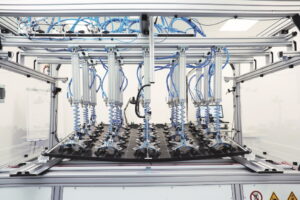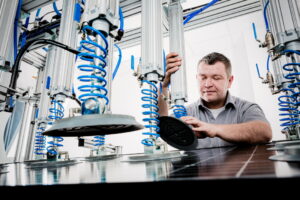
We have already reported on our upcoming trade fair appearance at Intersolar 2023. However, there is one highlight that we have not yet discussed in detail: The SUNLAB load table will demonstrate live at the trade fair stand three times a day how our in-house modules and mounting systems are subjected to endurance tests and have to prove their quality.
We have always been focused on high-quality products. In order to guarantee the highest standards at all times, our in-house modules and mounting systems are tested in the PV testing laboratory, SUNLAB, in a total of seven endurance tests for performance, stability and wear under various external influences. An important role is played by the load table, which performs a static-mechanical load test of the entire solar module in combination with the mounting system. In accordance with the standard DIN EN IEC 61215-2:2022-02 (MQT16), the module is alternately pressed down and pulled up with 2,400 Pascal. To simulate extra snow load, 5,400 pascal of pressure are even applied. Height sensors are used to measure the deflection of the module and an electronic load is used to measure current and voltage. In order to pass the test, the given specifications must not be exceeded. In addition, the module must not be bent or broken after the test and, according to the standard, must not lose more than 5% of its capacity. We at IBC SOLAR even go one step further and only accept modules that have no more than 3 % power loss after the tests.
The test process on the load table can be followed live at our trade fair stand. The exclusive cooperation with SUNLAB at Intersolar 2023 puts our high quality standards at the heart of our trade fair appearance.
The SUNLAB testing laboratory

The impartial testing laboratory tests photovoltaic modules and components on the basis of professional and standardised test procedures. In doing so, SUNLAB is accessible to a broad customer base and also enables measurements and tests to be carried out for official expert reports for use in court.
Photovoltaic components are exposed to a wide range of influences – from weather and manufacturing to wear and tear. At SUNLAB, PV specialists use seven different test procedures over an area of around 250 square metres to check whether the products deliver what they promise. Besides testing on the load table, SUNLAB also conducts performance and electroluminescence measurements in a solar simulator. In climate chambers, the modules are exposed to extreme heat, cold and moisture in order to reveal possible degradation (reduction in performance). Moreover, they are tested in a water basin for any current leakage that could lead to damage and safety hazards.
Thanks to these extensive tests, customers benefit from maximum security in terms of warranty, guarantee and recourse. This is because quality defects and damage to PV modules or mountings are often not recognisable from the outside. Standardised test procedures in selected machines and a laboratory environment guarantee reliable, objective results.
Would you like to see the load table in action? Then come and visit us at our stand. Our experts are looking forward to active discussions at Intersolar Europe from 14 to 16 June 2023 in Hall A4, Stand A4.470 and A4.670.